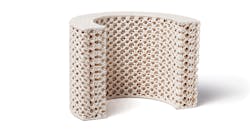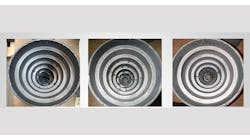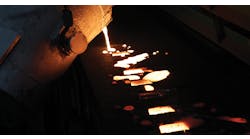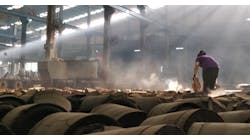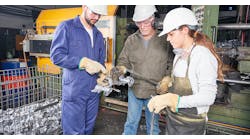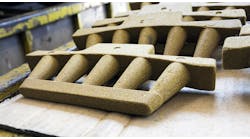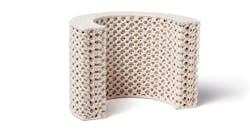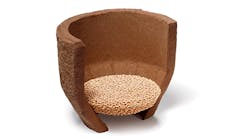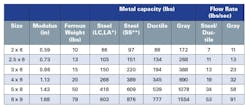Latest from Ask the Expert
Standard, fiber-based insulating pouring cups are made with highly refractory alumina fiber. These materials are sufficiently robust to handle direct metal impingement while maintaining a low density, to ensure requirements for beneficial feeding. This technology, paired with reticulated ceramic filters, make it possible to implement a Feed/Fill mechanism that calmly handles the metal stream as it enters the casting cavity.
Typical filter / sleeve combinations are determined according to the specific alloy and casting feed requirements.
Filters typically are chosen based on the metal alloy: Iron and non-ferrous alloys will be managed with silicon carbide (SiC) filters. Steel alloys will require a high-temperature zirconia (ZR) or carbon-bonded alumina (CB) refractory.
The choice of filter for a steel casting application is based entirely on the temperature and fluidity of the alloy.Lower-temperature alloys (2,880°F and lower) tend to require a carbon-bonded (CB) filter to aid in the task of filter priming.Regular steel pouring temperatures (above 2,880°F) typically have enough thermal energy and fluidity to prime zirconia (ZR).Zirconia filters are a stronger and more efficient filter material, so this material should be used whenever possible.
Sleeves are chosen on the feed requirements for the casting.Pouring cups are available in standard sizes from 2- through 6 inches (2x6, 2.5x6, 3x6, 4x6, 5x8, and 6x9-inch models are the most common.)
Shown here is a chart that highlights the feed/filter capacities for standard direct-pour products.
In some applications, the standard direct-pouring products are not large enough to handle the feeding requirements and/or the capacity requirements of the casting.Sometimes these applications may benefit by applying a tapered filter, coupled with neckdown riser sleeves.Neckdown riser sleeves allow for a very effective modulus in a direct pouring process.
The ability to customize a tapered filter gives customers the benefit of creating the most cost-effective direct pouring system for their casting. It is critical to remember to avoid a metal drop of more than 12 inches after exiting the filter, and to allow filter floatation whenever possible. This will allow the maximum cross-sectional area of riser contact, and promote the most repeatable riser performance.
Join the Conversation. Email Your Questions for ASK Chemicals
Share your insights, opinions, and elaborate on the questions and the experts' answer(s). You must be logged in to the website in order to post your comments.
